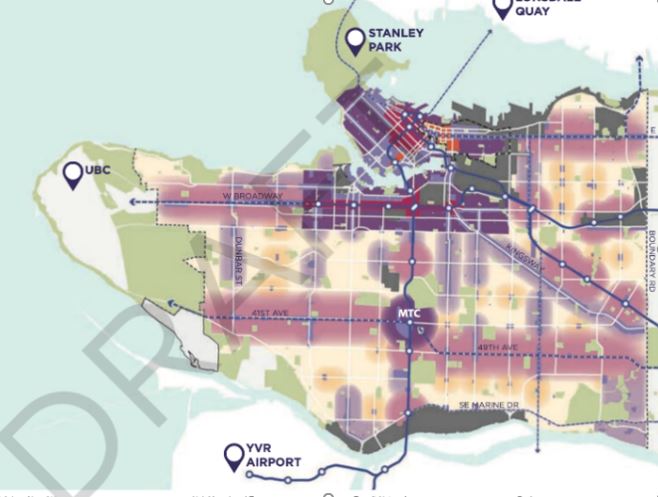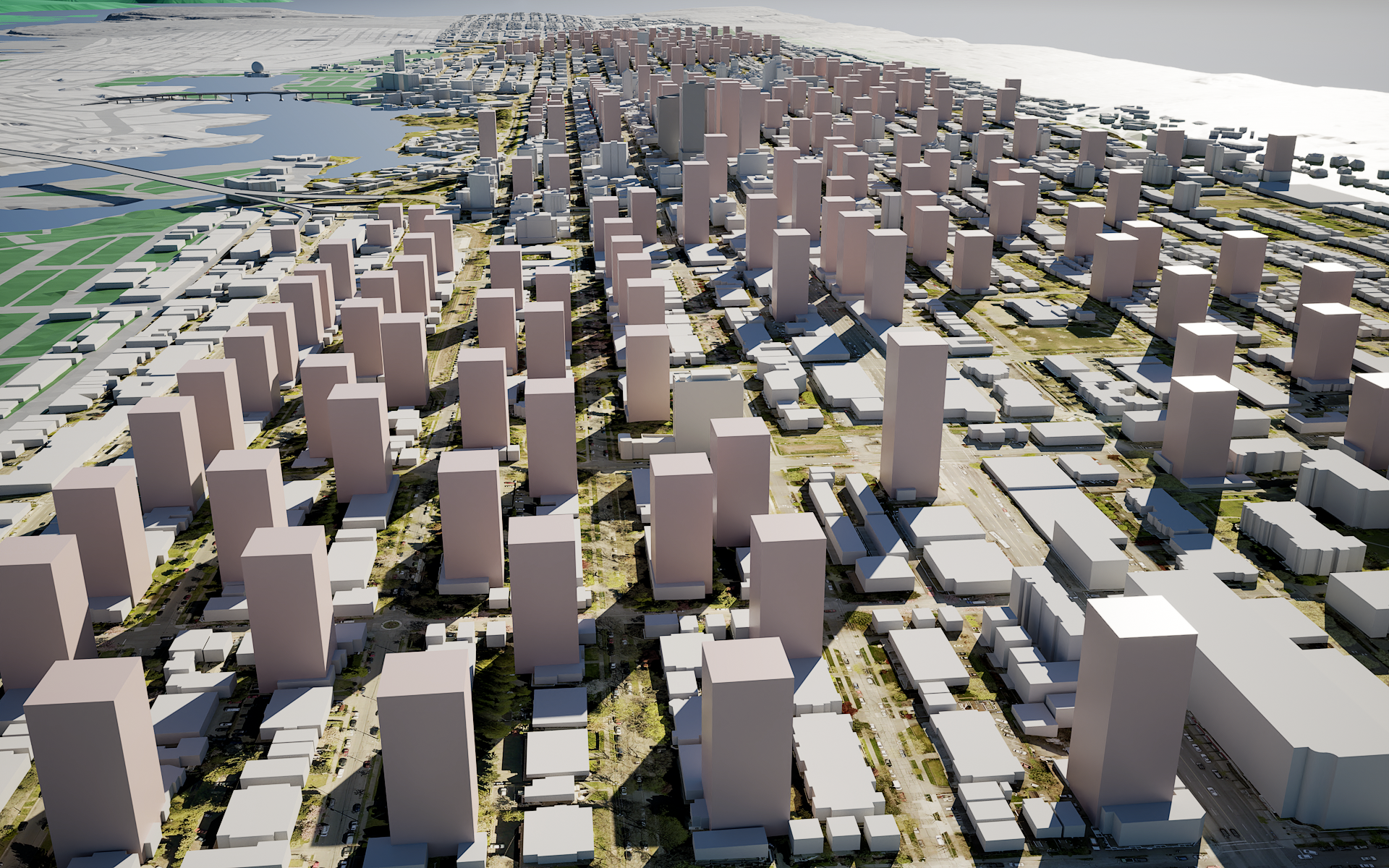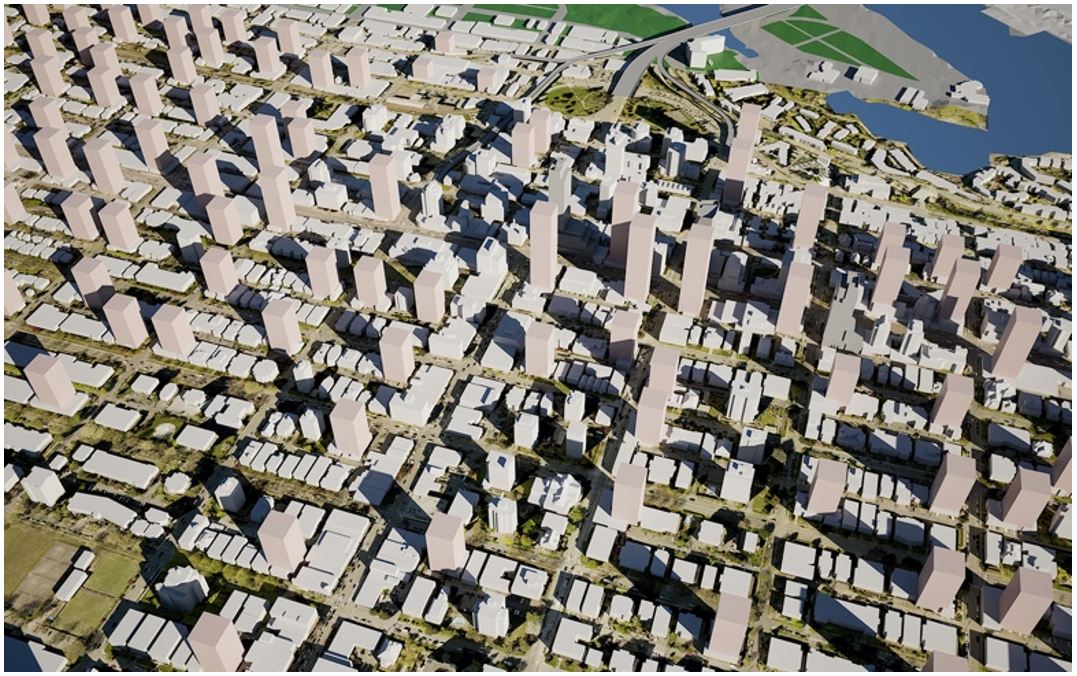(See PDF for full formatted document: CVN Letter re Metro 2050 to CoV Council-2022-06-21-V2)
June 19, 2022
City of Vancouver
Attention: Mayor Stewart and Councillors
Re: Metro Vancouver 2050 Regional District Regional Growth Strategy (RGS) Bylaw No. 1339, 2022, Metro 2050 Acceptance
Council Agenda: https://council.vancouver.ca/20220621/regu20220621ag.htm
CoV Staff Report: https://council.vancouver.ca/20220621/documents/r1.pdf
The Coalition of Vancouver Neighbourhoods (CVN) has major concerns regarding the proposed Metro 2050 Bylaw and we are opposed to it as currently written.
Attached is our letter sent to the Metro Vancouver Regional District for the Metro public hearing in which the mayor and many of the councillors participated. Only nine people from across the entire region spoke at the public hearing, reflecting the lack of public awareness and involvement. Our stated concerns remain, and we request that the City of Vancouver propose amendments to the Metro 2050 Regional Growth Strategy (RGS) to address these issues prior to acceptance.
Of particular concern are the following items for suggested amendments in the RGS:
- Request that projections for population and dwellings be shown separately by each individual municipality, and not grouped together with Vancouver, Burnaby and New Westminster. We also request that the years of data line up with the census years (2021, 2026, 2031, 2036, etc.);
- Remove aspirational targets that are not based on transparent data and facts;
- Remove the new designation of “Major Transit Growth Corridors” that are proposed along routes that are currently only bus routes where there are no immediate plans, approvals or funding for major transit expansion or other required amenities for growth;
- Reconsider transit to serve the whole arterial grid affordably, with development based on local neighbourhood context, rather than only a few expensive corridors with excessive growth tower typologies; and
- Refer this back to CoV staff for public and stakeholder consultation since most people are unaware of this important plan and have not had an opportunity for meaningful input. This should include affected boards such as the Vancouver School Board that was not consulted as part of the advisory committee.
Sincerely,
The Steering Committee,
Coalition of Vancouver Neighbourhoods (CVN)
Attachment – CVN letter to Metro Vancouver dated April 20, 2022
https://coalitionvan.org/wp-content/uploads/2022/06/CVN-Letter-re-Metro-2050-to-CoV-Council-2022-06-21-V2.pdf
April 20, 2022
Metro Vancouver Regional District Board of Directors
Re: April 20 Public Hearing to consider Metro Vancouver Regional District Regional Growth Strategy (RGS) Bylaw No. 1339, 2022 (METRO 2050)
Agenda: http://www.metrovancouver.org/boards/GVRD/RD_2022-Apr-20_AGE.pdf
Report: http://www.metrovancouver.org/metro2050
http://www.metrovancouver.org/services/regional-planning/PlanningPublications/Metro2050.pdf
The Coalition of Vancouver Neighbourhoods (CVN) includes resident groups from across the City of Vancouver. We have major concerns regarding the proposed Metro 2050 Bylaw and therefore are opposed to it as currently written.
Promotion of Growth: This document is more about promoting unsustainable growth than anything else. There are many substantial issues, some of which are as follows.
- Lack of Transparent Data – The projections for population and dwellings are not shown by municipality, so there is no way to measure how any municipal-level Regional Context Statements or Official Community Plans line up with regional plans or census data. Having Vancouver grouped with Burnaby and New Westminster, without any breakdown, makes no sense. The projection years should also be aligned with the census years so that data can be compared.
- Reliance on “Aspirational” Targets – With this draft bylaw the approach to growth shifts from data-based projections to “aspirational” targets. The result is promoting development beyond what actual population growth would justify, and is unsustainable.
- Impacts on Climate – The proposed increased growth will substantially increase the embodied carbon and ecological footprint in the region. Many municipalities have declared a climate emergency, but the approaches taken in the proposed bylaw are not compatible efforts to fight climate change.
- Development Is Promoted Ahead of Transit – The new designation of “Major Transit Growth Corridors” is proposed along routes that are currently only bus routes where there are no immediate plans, approvals or resources for major transit expansion. This means that for 1 kilometer, or 1000 meters, in each direction from existing transit routes, the new “corridors” will cover most of some neighbourhoods. There could be vast impacts, including significant disruptions of existing housing (including existing secondary rentals), and major construction/development growth could race ahead without any meaningful transit improvements.
For example, in Vancouver the proposed corridors cover:
- Kingsway, Grandview Hwy., and Hastings St. – These areas are currently only planned for buses and go through neighbourhoods that are historically amenity- and infrastructure-deficient. As just one example, to this day, no amenities that were promised with the rezoning of the Norquay neighbourhood over a decade ago have been delivered.
- 41st / 49th Ave. – These routes currently only have buses running on them, and they are not a regional priority for upgrades.
- Broadway corridor extension to UBC – This area currently only has bus transit services and is NOT a regional priority for a subway extension. At one kilometer in each direction along the route, development, which would certainly occur long before transit improvements, would affect the whole neighbourhoods of Kitsilano and West Point Grey without the supporting transit or infrastructure.
- Vancouver Was Designed for Grid Arterial Transit Not Corridors – Vancouver was designed pre-war, before the common use of the automobile. It is inherently transit-oriented, so everywhere is within a 10-minute walk of an arterial road. Vancouver was designed around the streetcar (on rail) and later converted to be served by trolley buses (on roads). All Vancouver really needs is more electric bus service to electrify the transit system. It doesn’t need the whole city to be rebuilt into only a few expensive corridors.
Transit corridors and tall towers is an American model that doesn’t apply to Vancouver, due to its fundamentally different design with arterial grid transit system. We just need more electric bus service for each arterial.
- Lack of Infrastructure and Financing Options – The proposed growth written into the bylaw will also put significant pressure on all aspects of infrastructure, without the resources to provide these needed increases and upgrades. The result will be significant upward pressure on property taxes and fees, and negative impacts on affordability and livability. At the same time, the bylaw proposes the waiving of development fees for “affordable” housing, meaning that infrastructure would be 100% funded by property taxes, without other sources identified.
- School Districts Are Underfunded – There is already a lack of provincial funding for schools to meet current growth in the region. Existing schools are being closed and sold to fund new schools. This is cannibalizing the school system and not sustainable. The proposed growth will then require more funding for land acquisition and construction for new schools.
- Lack of Health and Social Infrastructure – The province is not currently providing enough family doctors for the current population. Hospitals are stretched. Communities lack addiction and mental health treatment and supports. More growth means more displacement, forcing many to fall further behind or into homelessness. The provincial and federal governments are not keeping up with current needs, and there is no consideration of how they will provide the resources for this growth. The bylaw fails to consider such issues.
Weak Green Zone Protections from Urban Sprawl: The primary role of regional planning is to protect the green zones of conservation, recreation and Agricultural Land Reserve from urban sprawl to create a livable and sustainable region. This proposed plan continues to weaken these protections from what existed in the original Livable Region Strategic Plan and has already been weakened by Metro 2040, the Regional Growth Strategy adopted in 2011.
- Urban Sprawl in North Shore – Also of concern is the expansion of the Urban Containment Boundary that allows “General Urban” into green zones such as exist on the North Shore. The proposed bylaw also has a huge “Special Study Area” that could allow urban sprawl to move even further up the mountainside. There are many implications, including the fact that these mountain views also play an important role in regional identity and their ecosystems are a carbon sink to fight climate change.
- UBC Golf Course – This should be in the “Conservation and Recreation Lands,” not “General Urban.” The golf course is not available for potential development until 2080, well beyond the scope of this proposed bylaw.
- Special Study Areas – The proposed bylaw only requires a 50% + 1 weighted vote of the MVRD board to remove Special Study Areas from a green zone and convert into General Urban. This is lower than the currently-required 2/3 vote and should not be reduced. Under the Livable Region Strategic Plan, a 100% vote was required. The current vote threshold is already very weak and should not be weakened further.
Lack of Process: There has been little to no resident involvement by the residents of the City of Vancouver in this plan. Most residents are unaware that this Metro 2050 discussion, Bylaw, and Public Hearing is even happening. What we have enumerated above is just a small indication of many concerns about Metro 2050 and its implications for the people of Vancouver and for the entire Metro Vancouver region.
Further, we are alarmed that in this bylaw formulation there has also been no involvement of any of the Boards of Education across the region, B.C. ministry of Education and Child Care, police departments across the region, or B.C.’s Solicitor General and Attorney General Ministries. Input from all of them needs to be considered to respond to the proposed growth.
In conclusion, we request that the Metro Vancouver Board reject the Metro Vancouver Regional District Regional Growth Strategy (RGS) Bylaw No. 1339, 2022 (METRO 2050).
Sincerely,
Elizabeth Murphy
On behalf of the Steering Committee,
Coalition of Vancouver Neighbourhoods (CVN)
www.coalitionvan.org, info@coalitionvan.org
Member Groups of the Coalition of Vancouver Neighbourhoods
Arbutus Ridge Community Association
Arbutus Ridge/ Kerrisdale/ Shaughnessy Visions
Cedar Cottage Area Neighbours
Dunbar Residents Association
Fairview/South Granville Action Committee
False Creek Residents Association
Grandview Woodland Area Council
Granville-Burrard Residents & Business Assoc.
Greater Yaletown Community Association
Kitsilano-Arbutus Residents Association
Kits Point Residents Association
Marpole Residents Coalition
NW Point Grey Home Owners Association
Oakridge Langara Area Residents
Residents Association Mount Pleasant
Riley Park/South Cambie Visions
Shaughnessy Heights Property Owners Assoc.
Strathcona Residents Association
Upper Kitsilano Residents Association
West End Neighbours Society
West Kitsilano Residents Association
West Point Grey Residents Association
West Southland Residents Association



